Share

Limitless Africa
How can Africans get their voices heard in international institutions?
Historically Africans have not been well represented in international institutions. This is a problem: these organizations are key to tackling things like climate change and Covid-19.
But with a Nigerian leading the World Trade Organization and an Ethiopian heading the World Health Organization, that could be changing.
But is this happening fast enough? How can Africans make sure their voices are heard on the world stage?
Pedro Matos has worked for the United Nation and the World Food Programme for well over a decade. He was part of the team which won the Nobel Peace Prize in 2020 and he was working till recently in Sudan, delivering food and assistance to over six million people.
Mutemi Wa Kiama is an activist from Nairobi, Kenya. He’s known for campaigning against aid in the shape of international loans.
Dr Oby Ezekwesili is a former Education minister in the Nigerian government and a former Vice President of the World Bank (Africa Region). She was also the co-founder of the #BringBackOurGirls movement.
Made possible with a grant from the U.S. Department of State and the Seenfire Foundation.
More episodes
View all episodes
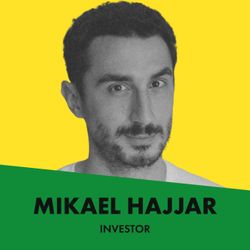
32. "The world of entrepreneurship in Africa and that of Silicon Valley are converging"
22:40||Season 3, Ep. 32"There is a specific type of risk-taking that is always rewarded"Mikael Hajjar runs P1 Ventures. P1 Ventures has raised its first $50 million dollars fund at the beginning of 2025. But what’s particularly interesting is that half of the fund will be invested in Francophone Africa. He tells Claude why Francophone Africa is the next investment hotspot.Plus: The biggest start-ups in Francophone Africa🌟 IN THIS EPISODE:1:56 From Mauritania to Silicon Valley3:37 The success of the American mindset7:19 The unfair advantage of Francophone Africa10:17 The shift from expats to repats13:57 The reality of trust in Africa16:55 The start-up ecosystem in Mauritania18:50 A new generation of founders💬 QUOTES TO REMEMBER:"Most of the successful entrepreneurs in in Silicon Valley are transplants from all over the world.""Silicon Valley has the most concentration of people that want to make a difference in the world""One of the biggest misconceptions about the Africa AI ecosystem is that it it lacks depth in the application layer"🌍 ABOUT LIMITLESS AFRICAThe podcast that asks how Africans and Americans can work together for shared prosperityEvery Monday: 15-minute episodes that dive into an issue that matters to AfricansEvery Thursday: extended interview with someone unlocking Africa's limitless potential➕ WANT MORE?Investor Lina Kacyem tells us why Francophone Africa is a hotspot for investors https://trueafrica.co/article/podcast/why-francophone-markets-are-the-next-investment-hotspot/“The VC model is the wrong fit for Africa. Do something different.” https://trueafrica.co/article/podcast/the-vc-model-is-just-fundamentally-the-wrong-fit-for-africa-you-have-to-do-something-different/Is venture capital the right choice for African start-ups? https://trueafrica.co/article/podcast/is-venture-capital-the-right-choice-for-african-start-ups/“Foreign aid has fuelled corruption, dependence, weak governance” - Maya Horgan Famodu https://trueafrica.co/article/podcast/foreign-aid-has-fuelled-corruption-dependence-weak-governance/💗 LOVE LIMITLESS AFRICA?Subscribe on Spotify, Apple or wherever you get your podcastsLeave a 5⭐ review – it helps get the word outShare with someone passionate about investing in Africa🚀 FOLLOW LIMITLESS AFRICAInstagram: @_trueafricaWebsite: https://trueafrica.co/Substack: https://limitlessafrica.substack.com/Limitless Africa is sponsored by the US Department of State and the Seenfire Foundation.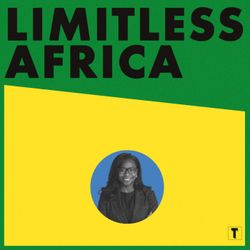
31. Why Francophone markets are the next investment hotspot
14:29||Season 3, Ep. 31"What is this country with good roads and electricity and water?"Francophone Africa is home to some of the continent’s fastest-growing economies, yet it continues to receive a disproportionately small share of global venture capital and startup investment.In this episode of Limitless Africa, hosts Dimpho Lekgeu and Claude Grunitzky speak with Lina Kacyem, Investment Manager at Launch Africa Ventures, about why Francophone African markets remain overlooked by American investors and what is being missed as a result. Drawing on her experience spending nearly two decades in the United States before relocating to Abidjan, Casim explains how historical legacies of colonization, legal systems, language, and business culture continue to shape investor behaviour. She contrasts Anglophone and Francophone market dynamics, from regulatory frameworks and communication styles to diaspora networks and trust-building practices.The conversation also explores infrastructure development in countries such as Côte d’Ivoire, the role of face-to-face relationships in Francophone business environments, and why the CFA franc’s peg to the euro offers a degree of currency stability often misunderstood by foreign investors. As global funds search for new growth opportunities, this episode argues that Francophone Africa represents one of the most compelling and underexplored frontiers on the continent.Plus: The appeal of the American mindset🌟 IN THIS EPISODE:3:00 Differences between the Francophones and Anglophones6:09 The times they are a-changin?8:42 Fat B - SI JE TE DIS que je t'aime9:46 Why should Americans invest in Africa?💬 QUOTES TO REMEMBER:"If you align with the right people, there are a lot of opportunities for gains. ""Numbers don't lie. Look at growth.""Americans are used to social mobility."🌍 ABOUT LIMITLESS AFRICAThe podcast that asks how Africans and Americans can work together for shared prosperityEvery Monday: 15-minute episodes that dive into an issue that matters to AfricansEvery Thursday: extended interview with someone unlocking Africa's limitless potential➕ WANT MORE?“We don’t have huge numbers, but we have huge profits” - Olivier Madiba on building Cameroon's most successful gaming studio https://trueafrica.co/article/podcast/olivier-madiba-video-gaming-africa/How crypto is making sending money cheaper in Africa https://trueafrica.co/article/podcast/how-crypto-is-making-sending-money-cheaper-in-africa/How Africa is basketball’s next big business move https://trueafrica.co/article/podcast/why-nba-africa-means-business/💗 LOVE LIMITLESS AFRICA?Subscribe on Spotify, Apple or wherever you get your podcastsLeave a 5⭐ review – it helps get the word outShare with someone passionate about investing in Africa🚀 FOLLOW LIMITLESS AFRICAInstagram: @_trueafricaWebsite: https://trueafrica.co/Substack: https://limitlessafrica.substack.com/🤝 FRIENDS OF LIMITLESS AFRICAWe're delighted to feature Fat B, an amazing rapper from Benin - follow her here www.instagram.com/fatb_98 and here https://www.facebook.com/FatbinoisLimitless Africa is sponsored by the US Department of State and the Seenfire Foundation.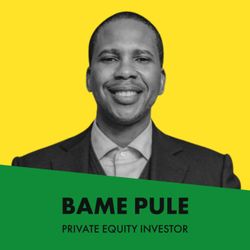
30. Bame Pule - "Investments in the US were incremental; in Africa they would be transformational"
23:09||Season 3, Ep. 30"That's where I think we've missed a trick. And that's really where I have focused my entrepreneurship and energy and time and talent"Bame Pule is the chief executive of private equity firm Africa Lighthouse Capital, based in Botswana. He is a graduate of Pomona College in California and received his MBA degree from Harvard Business School. He worked at Goldman Sachs, Credit Suisse, Citigroup, some of the biggest names in finance. But we wanted to find out why he decided to move back to the African continent, even though he was on a fast track in the United States. (Interview from 2025)Plus: Why risk premium is often mispriced🌟 IN THIS EPISODE:2:49 Why return to Africa?5:52 Why local investors matter more than foreign8:58 Family offices investing in Africa11:50 Why America matters16:12 American investors looking to Africa💬 QUOTES TO REMEMBER:"We need foreign investment and we want foreign investment. ""People see an opportunity for strong financial returns and good businesses.""As Africans, we don't just want investment, but we recognize that we are dealing with investors.""There is untapped market and untapped talent."🌍 ABOUT LIMITLESS AFRICAThe podcast that asks how Africans and Americans can work together for shared prosperityEvery Monday: 15-minute episodes that dive into an issue that matters to AfricansEvery Thursday: extended interview with someone unlocking Africa's limitless potential➕ WANT MORE?“The VC model is the wrong fit for Africa. Do something different.” https://trueafrica.co/article/podcast/the-vc-model-is-just-fundamentally-the-wrong-fit-for-africa-you-have-to-do-something-different/Is venture capital the right choice for African start-ups? https://trueafrica.co/article/podcast/is-venture-capital-the-right-choice-for-african-start-ups/“Foreign aid has fuelled corruption, dependence, weak governance” - Maya Horgan Famodu https://trueafrica.co/article/podcast/foreign-aid-has-fuelled-corruption-dependence-weak-governance/💗 LOVE LIMITLESS AFRICA?Subscribe on Spotify, Apple or wherever you get your podcastsLeave a 5⭐ review – it helps get the word outShare with someone passionate about investing in Africa🚀 FOLLOW LIMITLESS AFRICAInstagram: @_trueafricaWebsite: https://trueafrica.co/Substack: https://limitlessafrica.substack.com/Limitless Africa is sponsored by the US Department of State and the Seenfire Foundation.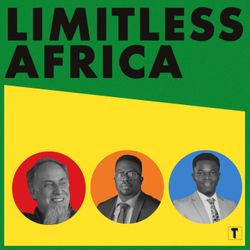
29. What is holding back internet connectivity in Africa?
14:16||Season 3, Ep. 29"Big companies are waking up to this opportunity and are moving in."Today, we’re talking about something that shapes everything from jobs to education to healthcare… internet access.And Africa, we have a problem! Only a fifth of our population have access to the internet... compare that to the global average of about 70%. Africa is lagging behind.We wanted to find out why. And what can be done about it.Plus: How laser beams are replacing satellites.🌟 IN THIS EPISODE:2:08 Why internet is still a problem3:26 Leapfrogging fibre5:48 How African start-ups are providing solutions7:41 Laser beams bringing internet10:37 Impact on poverty💬 QUOTES TO REMEMBER:"Kenya has much better connectivity than the U.S. does.""People on the street need to feel the impact of a cable that's lying on their shores."🌍 ABOUT LIMITLESS AFRICAThe podcast that asks how Africans and Americans can work together for shared prosperityEvery Monday: 15-minute episodes that dive into an issue that matters to AfricansEvery Thursday: extended interview with someone unlocking Africa's limitless potential➕ WANT MORE?The entrepreneur bringing refrigeration to Africa https://trueafrica.co/article/podcast/how-i-made-it-the-entrepreneur-bringing-refrigeration-to-africa/How crypto is making sending money cheaper in Africa https://trueafrica.co/article/podcast/how-crypto-is-making-sending-money-cheaper-in-africa/“African AI solutions are not being talked about” https://trueafrica.co/article/podcast/african-homegrown-ai-solutions-are-not-being-talked-about/💗 LOVE LIMITLESS AFRICA?Subscribe on Spotify, Apple or wherever you get your podcastsLeave a 5⭐ review – it helps get the word outShare with someone passionate about pop culture in Africa🚀 FOLLOW LIMITLESS AFRICAInstagram: @_trueafricaWebsite: https://trueafrica.co/Substack: https://limitlessafrica.substack.com/🤝 FRIENDS OF LIMITLESS AFRICAKendall Ananyi https://www.linkedin.com/in/kendall-ananyiFrank Eleanya https://ng.linkedin.com/in/frank-eleanya-0514b335Jay Shapiro https://ke.linkedin.com/in/jayshapiroLimitless Africa is sponsored by the US Department of State and the Seenfire Foundation.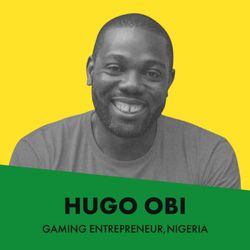
28. Entrepreneur Hugo Obi - "Game revenue exceeds film and music combined"
25:45||Season 3, Ep. 28"We haven't provided the market with a clear proposition from a confidence standpoint."Welcome to our extended episode with Hugo Obi - the founder of Maliyo Games. It's a gaming studio based in Lagos, Nigeria. They design, develop, and distribute games to mobile audiences on the continent. And in 2024, they partnered with the US company Disney to launch a mobile game. Nigeria has the largest gaming population on the continent. That's around 46 million people. So, as the founder of one of the leading studios in Nigeria, what Hugo says matters.🌟 IN THIS EPISODE:1:00 About Maliyo Games3:46 Working with Disney6:45 Surprising findings in the gaming research8:29 How to increase monetization12:24 The value chain16:53 How Nigeria can catch up with South Africa19:32 Studio maturity20:16 The confidence gap21:33 What Africa can offer America💬 QUOTES TO REMEMBER:"Just because they don't monetize as well as North Americans, doesn't mean that Africans don't deserve to play.""We haven't provided the market with a clear proposition from a confidence standpoint.""There's also that opportunity for taking the local content to a global market."🌍 ABOUT LIMITLESS AFRICAThe podcast that asks how Africans and Americans can work together for shared prosperityEvery Monday: 15-minute episodes that dive into an issue that matters to AfricansEvery Thursday: extended interview with someone unlocking Africa's limitless potential➕ WANT MORE?Why young Africans could be the champions in e-sports https://trueafrica.co/article/podcast/why-young-africans-could-be-the-champions-in-e-sports/"We don't have huge numbers, but we have huge profits" - interview with Cameroon's leading game developer https://trueafrica.co/article/podcast/olivier-madiba-video-gaming-africa/Peruse Maliyo Games' Africa Games Report https://africagamesreport.com/💗 LOVE LIMITLESS AFRICA?Subscribe on Spotify, Apple or wherever you get your podcastsLeave a 5⭐ review – it helps get the word outShare with someone passionate about gaming in Africa🚀 FOLLOW LIMITLESS AFRICAInstagram: @_trueafricaWebsite: https://trueafrica.co/Substack: https://limitlessafrica.substack.com/Limitless Africa is sponsored by the US Department of State and the Seenfire Foundation.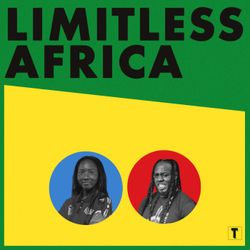
27. The young Africans set to be the next champions in e-sports
15:01||Season 3, Ep. 27"Gaming saved my life."In this episode of Limitless Africa, Claude Grunitzky and Dimpho Lekgeu explore the rise of African e-sports with two of Kenya’s most compelling voices. Brian Diang’a, known as Brian The Beast, one of East Africa’s first professional e-sports athletes, and Shirley Adema, also known as Dark Willow, a competitive Dota player and co-founder of Tunza E-sports. Through their stories, this episode unpacks how gaming is becoming both a career and a lifeline. From escaping violence in Kibra to creating safe spaces for young women in gaming, the episode uncovers an unexpected source of talent, innovation, and youth empowerment.Plus: The pitfalls of being a woman in gaming🌟 IN THIS EPISODE:1:21 Why are e-sports gamers athletes?3:51 How gaming saves lives?6:51 How American athletes inspire others9:01 From virtual to IRL skills12:08 Girls in gaming💬 QUOTES TO REMEMBER:"Everything I do in gaming is inspired by the U.S.""I want to leave a legacy.""When you're a lady, there are more opportunities"🌍 ABOUT LIMITLESS AFRICAThe podcast that asks how Africans and Americans can work together for shared prosperityEvery Monday: 15-minute episodes that dive into an issue that matters to AfricansEvery Thursday: extended interview with someone unlocking Africa's limitless potential➕ WANT MORE?Can Africa and America win the AI race? https://trueafrica.co/article/podcast/why-america-is-africas-best-partner-in-the-ai-race/How Africa is transforming video gaming https://trueafrica.co/article/podcast/how-is-africa-transforming-the-future-of-video-gaming/“We don’t have huge numbers, but we have huge profits” https://trueafrica.co/article/podcast/olivier-madiba-video-gaming-africa/💗 LOVE LIMITLESS AFRICA?Subscribe on Spotify, Apple or wherever you get your podcastsLeave a 5⭐ review – it helps get the word outShare with someone passionate about pop culture in Africa🚀 FOLLOW LIMITLESS AFRICAInstagram: @_trueafricaWebsite: https://trueafrica.co/Substack: https://limitlessafrica.substack.com/Limitless Africa is sponsored by the US Department of State and the Seenfire Foundation.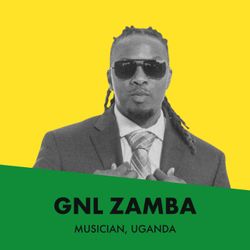
26. Rapper GNL Zamba - "Sometimes to build Africa, you have to leave Africa."
34:43||Season 3, Ep. 26Welcome to our extended episode with G. N. L. Zamba, a Ugandan hip-hop artist who lives between Kampala and Los Angeles. He's the founder and CEO of the independent hip-hop record label Baboon Forest Entertainment. He's been credited with popularizing Lungaflow - a blend of Afrobeats and Luganda, the most widely spoken of Uganda's 40 languages. In this extended episode, he talks to Claude about why American rappers like Nas are such an inspiration.🌟 IN THIS EPISODE:3:47 How rapping in Luganda kickstarted it all8:07 The musical wildebeests of Uganda9:40 Coming to America13:00 Nas the legend20:53 Making money29:11 Advice for entrepreneurs💬 QUOTES TO REMEMBER:"If alignment is a thing, this must be it.""Africa is entering a creative renaissance""Your ancestors have been waiting for someone with your strength to carry their name""I would compare it to a wildebeest migration.""Sometimes to build Africa, you have to leave Africa."" My career was run like it was a business from the very beginning.""The Africans and the Americans have a chance right now"🌍 ABOUT LIMITLESS AFRICAThe podcast that asks how Africans and Americans can work together for shared prosperityEvery Monday: 15-minute episodes that dive into an issue that matters to AfricansEvery Thursday: extended interview with someone unlocking Africa's limitless potential➕ WANT MORE?“It’s all unseen and unknown as to how big this is” – Inside the business of podcasting https://trueafrica.co/article/podcast/its-all-unseen-and-unknown-as-to-how-big-this-is-molly-jensen-ceo-of-africas-largest-podcasting-platform/How to make money from your creativity https://trueafrica.co/article/podcast/how-can-african-creatives-make-money-from-their-art/💗 LOVE LIMITLESS AFRICA?Subscribe on Spotify, Apple or wherever you get your podcastsLeave a 5⭐ review – it helps get the word outShare with someone passionate about hip hop in Africa🚀 FOLLOW LIMITLESS AFRICAInstagram: @_trueafricaWebsite: https://trueafrica.co/Substack: https://limitlessafrica.substack.com/Limitless Africa is sponsored by the US Department of State and the Seenfire Foundation.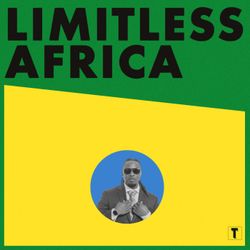
25. How hip hop can build a business empire
15:19||Season 3, Ep. 25"I would compare it to a wildebeest migration"Hip-hop is one of America’s most influential cultural exports. But what happens when African artists reclaim it through language, ancestry and community? In this episode of Limitless Africa, host Claude Grunitzky speaks with GNL Zamba, a Ugandan hip-hop artist, filmmaker and creative entrepreneur, about how African languages, independent systems and family-led business models are reshaping global hip hop. Zamba reflects on why switching to Luganda transformed his career, how Africa’s young population represents untapped creative power, and why financial success without community impact is incomplete. He also shares insights on avoiding exploitative industry contracts and building sustainable creative infrastructure between Africa and America.Plus: What the Beyonce family unit get so right🌟 IN THIS EPISODE:3:43 The yardstick to success5:17 Choosing Luganda over English6:54 Bobi Wine and the music scene in Uganda8:40 The importance of family in hip hop13:55 Who won the beef💬 QUOTES TO REMEMBER:"I chose Luganda because it is my ancestors' language.""Hip-Hop is going to change the world.""Once minds like ours connect, it's limitless.""Africa is going through a creative renaissance.""The Africans and the Americans have a chance right now to either catch up with the world or even overtake the world with the collaborations they can form."🌍 ABOUT LIMITLESS AFRICAThe podcast that asks how Africans and Americans can work together for shared prosperityEvery Monday: 15-minute episodes that dive into an issue that matters to AfricansEvery Thursday: extended interview with someone unlocking Africa's limitless potential➕ WANT MORE?The producer bringing African stories to the small screen https://trueafrica.co/article/podcast/we-need-that-visionary-brave-first-money-in/The Hollywood moguls investing in African wrestling https://trueafrica.co/article/podcast/how-hollywood-moguls-are-investing-in-african-wrestling/💗 LOVE LIMITLESS AFRICA?Subscribe on Spotify, Apple or wherever you get your podcastsLeave a 5⭐ review – it helps get the word outShare with someone passionate about pop culture in Africa🚀 FOLLOW LIMITLESS AFRICAInstagram: @_trueafricaWebsite: https://trueafrica.co/Substack: https://limitlessafrica.substack.com/Limitless Africa is sponsored by the US Department of State and the Seenfire Foundation.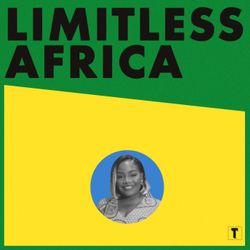
24. TV star Déborah Mutund - "People want to see themselves on television."
29:57||Season 3, Ep. 24"Why do we all dream of going to America today? Because we've seen movies our entire life portraying America as the but as the best place in the world. We want to go to Beverly Hills. But we need to create these same stories for ourselves."Déborah Mutund is a rising star in Francophone TV and the host of the reality TV show called Who Wants to Marry My Son? She talks to Claude Grunitzky about reality TV in Africa, why it’s key to soft power, and what’s holding us back from telling more of our own amazing, compelling, and inspiring stories.Plus: Why you can't get too steamy on African TV.🌟 IN THIS EPISODE:2:18 From PR to presenting4:59 Who wants to marry my son?9:40 Producing content costs money13:49 Idolizing America18:28 Self love, the American way22:23 Advice for the next Oprah26:47 The importance of self belief💬 QUOTES TO REMEMBER:"People are having their faces exposed and seen by the world. and they need to be able to protect themselves and live off that.""I love the dynamism that countries such as Benin and Ghana have. Cote d'Ivoire is also on the same pathway. We no longer dream of going to New York.""Hollywood is powerful because people are consuming Hollywood products.""People want to see themselves on television. They want to see people that look like themselves."🌍 ABOUT LIMITLESS AFRICAThe podcast that asks how Africans and Americans can work together for shared prosperityEvery Monday: 15-minute episodes that dive into an issue that matters to AfricansEvery Thursday: extended interview with someone unlocking Africa's limitless potential➕ WANT MORE?What happens when the Real Housewives come to Africa? https://trueafrica.co/article/podcast/what-happens-when-the-real-housewives-come-to-africa/Why Hollywood moguls are investing in African wrestling https://trueafrica.co/article/podcast/how-hollywood-moguls-are-investing-in-african-wrestling/💗 LOVE LIMITLESS AFRICA?Subscribe on Spotify, Apple or wherever you get your podcastsLeave a 5⭐ review – it helps get the word outShare with someone passionate about pop culture in Africa🚀 FOLLOW LIMITLESS AFRICAInstagram: @_trueafricaWebsite: https://trueafrica.co/Substack: https://limitlessafrica.substack.com/